Ford Focus vs Peugeot 308 - Differences and prices compared
Compare performance (280 HP vs 195 HP), boot space and price (27500 £ vs 29200 £) at a glance. Find out which car is the better choice for you – Ford Focus or Peugeot 308?
Costs and Efficiency:
Price and efficiency are often the first things buyers look at. Here it becomes clear which model has the long-term edge – whether at the pump, the plug, or in purchase price.
Ford Focus has a hardly perceptible advantage in terms of price – it starts at 27500 £, while the Peugeot 308 costs 29200 £. That’s a price difference of around 1723 £.
Fuel consumption also shows a difference: Peugeot 308 manages with 2.30 L and is therefore decisively more efficient than the Ford Focus with 4.90 L. The difference is about 2.60 L per 100 km.
Engine and Performance:
Power, torque and acceleration are the classic benchmarks for car enthusiasts – and here, some clear differences start to show.
When it comes to engine power, the Ford Focus has a clearly perceptible edge – offering 280 HP compared to 195 HP. That’s roughly 85 HP more horsepower.
In acceleration from 0 to 100 km/h, the Ford Focus is distinct quicker – completing the sprint in 5.70 s, while the Peugeot 308 takes 7.60 s. That’s about 1.90 s faster.
In terms of top speed, the Ford Focus performs slight better – reaching 250 km/h, while the Peugeot 308 tops out at 225 km/h. The difference is around 25 km/h.
There’s also a difference in torque: Ford Focus pulls noticeable stronger with 420 Nm compared to 300 Nm. That’s about 120 Nm difference.
Space and Everyday Use:
Beyond pure performance, interior space and usability matter most in daily life. This is where you see which car is more practical and versatile.
Both vehicles offer seating for 5 people.
In curb weight, Ford Focus is hardly perceptible lighter – 1330 kg compared to 1453 kg. The difference is around 123 kg.
In terms of boot space, the Peugeot 308 offers hardly perceptible more room – 412 L compared to 392 L. That’s a difference of about 20 L.
In maximum load capacity, the Ford Focus performs barely noticeable better – up to 1354 L, which is about 31 L more than the Peugeot 308.
When it comes to payload, Ford Focus slightly takes the win – 560 kg compared to 503 kg. That’s a difference of about 57 kg.
Who wins the race?
The Peugeot 308 proves to be edges ahead and therefore becomes our DriveDuel Champion!
Peugeot 308 is the better all-rounder in this comparison.
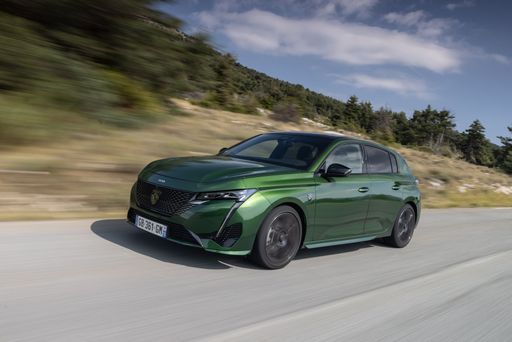
Peugeot 308
Costs and Consumption
View detailed analysis
Engine and Performance
View detailed analysis
Dimensions and Body
View detailed analysis
Ford Focus
The Ford Focus remains a clever all‑rounder that balances sharp handling with everyday comfort, making it a strong choice whether your commute is city streets or country lanes. Its practical cabin and sensible running costs mean you’ll spend more time enjoying the drive and less time worrying about ownership, with a playful streak underfoot that keeps things interesting.
details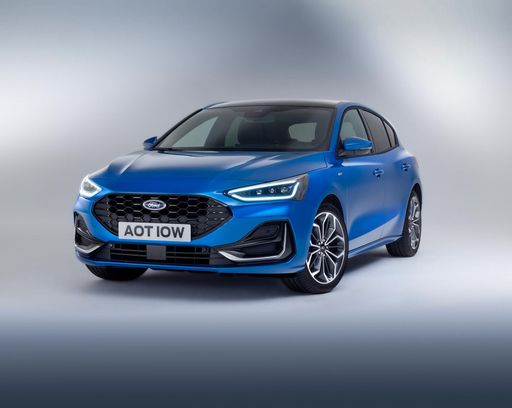
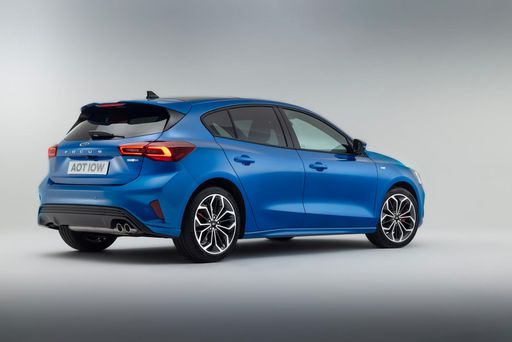
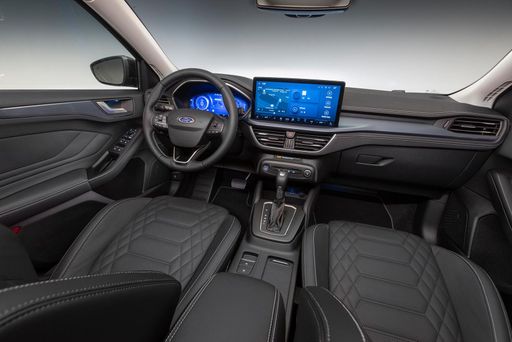
Peugeot 308
The Peugeot 308 brings a sleek, feline profile and an unexpectedly upscale cabin, with clever packaging and materials that feel a touch more premium than you might expect. It’s composed on the road, easy to live with for daily life, and a smart choice if you want a stylish hatch that still behaves when the road gets interesting.
details
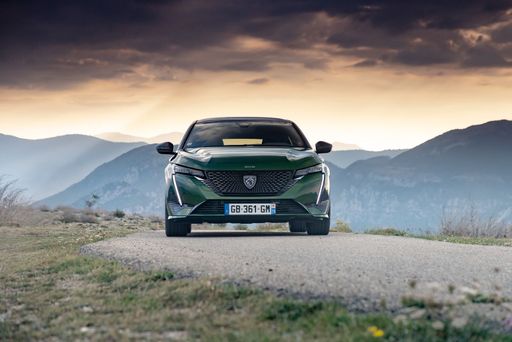
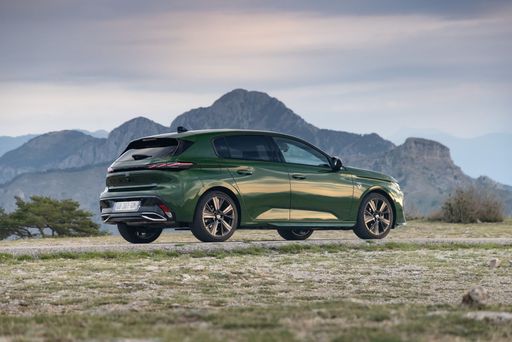
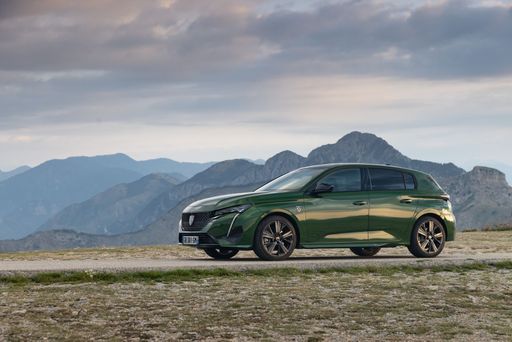
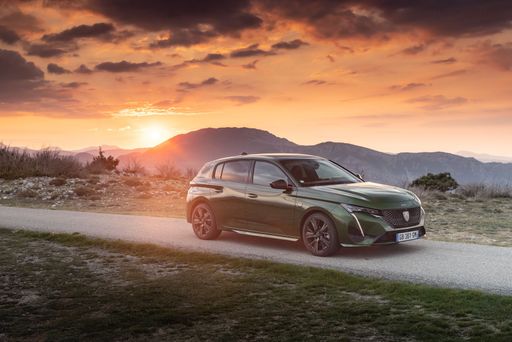
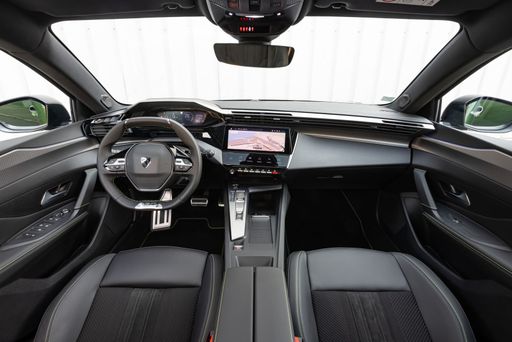

|

|
|
|
|
Costs and Consumption |
|
|---|---|
|
Price
27500 - 42700 £
|
Price
29200 - 42600 £
|
|
Consumption L/100km
4.9 - 8 L
|
Consumption L/100km
2.3 - 5 L
|
|
Consumption kWh/100km
-
|
Consumption kWh/100km
15.60 kWh
|
|
Electric Range
-
|
Electric Range
78 - 450 km
|
|
Battery Capacity
-
|
Battery Capacity
0.40 kWh
|
|
co2
117 - 183 g/km
|
co2
0 - 129 g/km
|
|
Fuel tank capacity
52 L
|
Fuel tank capacity
42 - 52 L
|
Dimensions and Body |
|
|---|---|
|
Body Type
Hatchback
|
Body Type
Hatchback
|
|
Seats
5
|
Seats
5
|
|
Doors
5
|
Doors
5
|
|
Curb weight
1330 - 1529 kg
|
Curb weight
1453 - 1749 kg
|
|
Trunk capacity
392 L
|
Trunk capacity
314 - 412 L
|
|
Length
4382 - 4397 mm
|
Length
4367 mm
|
|
Width
1825 - 1844 mm
|
Width
1852 mm
|
|
Height
1438 - 1482 mm
|
Height
1438 mm
|
|
Max trunk capacity
1354 L
|
Max trunk capacity
1258 - 1323 L
|
|
Payload
495 - 560 kg
|
Payload
430 - 503 kg
|
Engine and Performance |
|
|---|---|
|
Engine Type
Petrol MHEV, Diesel, Petrol
|
Engine Type
Petrol MHEV, Diesel, Plugin Hybrid, Electric
|
|
Transmission
Manuel, Automatic
|
Transmission
Automatic
|
|
Transmission Detail
Manual Gearbox, Dual-Clutch Automatic, Automatic Gearbox
|
Transmission Detail
Dual-Clutch Automatic, Automatic Gearbox, Reduction Gearbox
|
|
Drive Type
Front-Wheel Drive
|
Drive Type
Front-Wheel Drive
|
|
Power HP
115 - 280 HP
|
Power HP
131 - 195 HP
|
|
Acceleration 0-100km/h
5.7 - 11.8 s
|
Acceleration 0-100km/h
7.6 - 10.6 s
|
|
Max Speed
186 - 250 km/h
|
Max Speed
170 - 225 km/h
|
|
Torque
170 - 420 Nm
|
Torque
230 - 300 Nm
|
|
Number of Cylinders
3 - 4
|
Number of Cylinders
3 - 4
|
|
Power kW
85 - 206 kW
|
Power kW
96 - 144 kW
|
|
Engine capacity
999 - 2261 cm3
|
Engine capacity
1199 - 1598 cm3
|
General |
|
|---|---|
|
Model Year
2022 - 2024
|
Model Year
2025
|
|
CO2 Efficiency Class
D, G
|
CO2 Efficiency Class
C, D, B, A
|
|
Brand
Ford
|
Brand
Peugeot
|
What drive types are available for the Ford Focus?
Available configurations include Front-Wheel Drive.
The prices and data displayed are estimates based on German list prices and may vary by country. This information is not legally binding.
